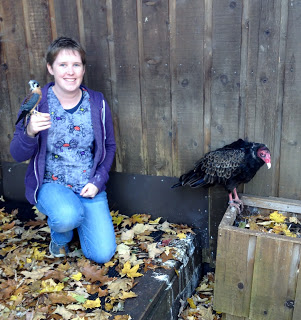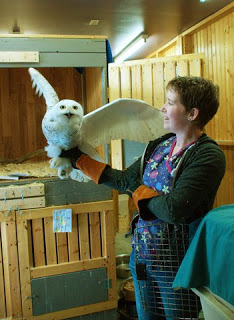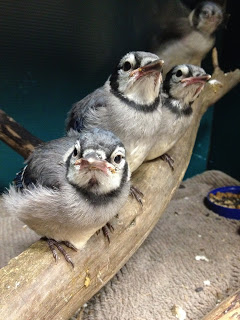October 29, 2015
Their Bags are Packed and They’re Ready to Go…Well, Most of Them
 |
| Patty McLaughlin with Wild Bird Care Centre mascot, Violet the Turkey Vulture, and Indigo, the American Kestrel |
The Ottawa Humane Society works in partnership with many community organizations to help the animals. The following is a guest post from the Wild Bird Care Centre.
Hello from the Wild Bird Care Centre, Ottawa’s only organization dedicated to the care, treatment and rehabilitation of injured or orphaned wild birds. Each year, the centre receives more than 2,400 wild birds from the Ottawa area.
You may have noticed that the birds are super busy at this time of the year. Either they’re building a flock to travel south or, they are busy growing an extra coat of down feathers and searching for high fat food sources for the cold months ahead. As our winters here in Ottawa are quite cold and sometimes downright unforgiving, the majority of our summer birds have the common sense to head south! The trip is not easy but with the amount of snow we get here, there just isn’t enough food for them to survive otherwise.
For birds who brave the Ottawa winter, many depend on our feeders as a major food source. Here are some tips and facts to make the most of your feeders:
- The best thing to offer the birds is high fat seeds, such as black oiled sunflower seeds and peanuts.
- Did you know that the Black-capped Chickadee caches extra seeds in small crevices and can remember where they put ALL of them for over a month?!
- Many small finches also stay throughout the winter and enjoy eating the very small nyjer seed. If you have trouble with unfavorable feeder guests, such as squirrels, consider putting up a nyjer feeder. The design of these feeders only allows a very small beak to grab the seeds and they are not very appealing to squirrels.
- Once the weather drops below freezing, you can also put out suet feeders and you will likely be quickly rewarded by seeing several of our local woodpecker and nuthatch species.
- Just as we suffer from more colds and flu in the winter time, so do the birds. It is important to occasionally wash those sick bird germs off your feeder with a 10-parts water to one-part bleach solution.
Many of the injured birds that come into the centre during the fall months have suffered injuries from hitting windows. Most small songbirds migrate at night to reduce their risk of predation and overheating. Large office buildings that keep their lights on during the night disorient the birds causing them to hit the windows. Window strikes during the day are usually due to the sun reflecting images, such as trees, on the outside of the window. Any mitigation measures to prevent window impacts, such as decals, must be placed on the outside of the window for them to be effective.
There is now an organization in Ottawa patrolling some of the known problem buildings for window strikes. For more information about how to prevent birds from hitting your windows visit FLAP.org, as they have many great ideas.
If you have found a bird that has possibly hit a window or is otherwise injured, toss a small towel over the bird to pick it up and place the bird in a small dark box lined with an old rag or towel. Tossing a towel over the bird will often calm it down. Allow the bird to rest for an hour and then bring the box outside for a release attempt. If the release fails, please bring the bird to the Wild Bird Care Centre for further treatment. The Wild Bird Care Centre is located at 734 Moodie Dr. and is open seven days a week from 8 a.m. to 4 p.m. We also have drop-off crates on the front porch for after hours drop-offs.
 COME AND VISIT US! Do you want to get an up close look at some of our local birds? The centre has visiting hours from noon to 3 p.m. daily, where you are welcome to do a self-guided walk through of the centre and see the birds through the viewing windows. There is no cost to visit the centre, however, donations are always greatly appreciated. The trails around the centre are easy to walk and are filled with chickadees eager to come down to your hand for some sunflower seeds!
COME AND VISIT US! Do you want to get an up close look at some of our local birds? The centre has visiting hours from noon to 3 p.m. daily, where you are welcome to do a self-guided walk through of the centre and see the birds through the viewing windows. There is no cost to visit the centre, however, donations are always greatly appreciated. The trails around the centre are easy to walk and are filled with chickadees eager to come down to your hand for some sunflower seeds!
For more information about the centre please visit www.wildbirdcarecentre.org
Patty McLaughlin, Education Coordinator
Wild Bird Care Centre

